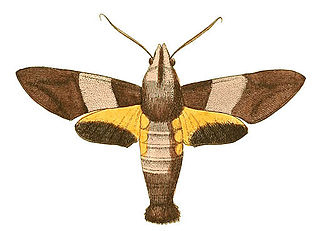
Macroglossum passalus, the black-based hummingbird hawkmoth, is a moth of the family Sphingidae described by Dru Drury in 1773. It is known from Sri Lanka, India, Thailand, south-eastern China, Taiwan, southern Japan, Indonesia and the Philippines.

Dactyloceras lucina is a species of very large moth of the family Brahmaeidae. It is found in central and west Africa, where it has been recorded from Equatorial Guinea, Ghana, Ivory Coast, Kenya, Sierra Leone, Uganda and Zambia. The species was first described by Dru Drury in 1782.

Ceretes thais is a moth in the Castniidae family. It is found in Brazil. Superficially it looks very like a butterfly, and was originally placed by Dru Drury in the "Papilio " group which mostly corresponds with modern Nymphalidae.

Pseudacraea hostilia, the western incipient false acraea, is a butterfly in the family Nymphalidae. It is found in Sierra Leone, Liberia, Ivory Coast and western and central Ghana. The habitat consists of wetter forests.

Hypocrita pylotis is a moth of the family Erebidae. It was described by Dru Drury in 1773. It is found in Honduras.
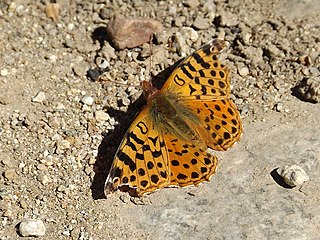
Yramea cytheris is a species of butterfly in the family Nymphalidae. It was first described by Dru Drury in 1773 from the Falkland Islands. In some systems it is included in genus Issoria.

Greta diaphanus, the Antillean clearwing, is a species of clearwing (ithomiine) butterflies, named by Dru Drury in 1773.

Imbrasia epimethea is a species of moth belonging to the family Saturniidae. It was first described by Dru Drury in 1773 from the Calabar coast.

Lucinia cadma is a species of brush-footed butterfly. It was first described by Dru Drury in 1773 from Jamaica. Distinct subspecies are found on other Caribbean islands.

Tifama is a monotypic moth genus in the family Notodontidae erected by Francis Walker in 1855. Its only species, Tifama chera, was first described by Dru Drury in 1773. The species is known from Suriname and Brazil.

Epimecis scolopaiae is a species of moth in the family Geometridae, subfamily Ennominae. It was first described by Dru Drury in 1773 from Jamaica.

Otroeda nerina is a species of moth in the tussock-moth subfamily Lymantriinae. It was first described by Dru Drury in 1782 from Sierra Leone, and is also found in Cameroon, DR Congo, Gabon, Ghana and Nigeria.

Panara jarbas is a species in the butterfly family Riodinidae found in Brazil. It was first described by Dru Drury in 1782.
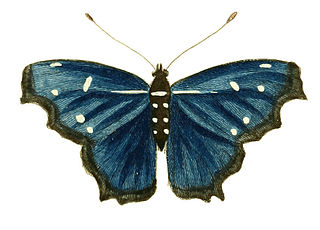
Myscelia orsis is a species of nymphalid butterflies native to Brazil. It was first described by Dru Drury in 1782.

Typhedanus crameri is a species of butterfly in the family Hesperiidae, native to Central America and Suriname. It was described by Pieter Cramer in 1777 using the name Papilio orion, which was preoccupied. A replacement name honouring Cramer was designated in 1960.

Pseudobunaea alinda is a species of very large moths in the family Saturniidae. The species was first described by Dru Drury in 1782, and is found in Angola, Cameroon, Congo, DR Congo, Gabon, Guinea, Ivory Coast, Sierra Leone, and Tanzania.
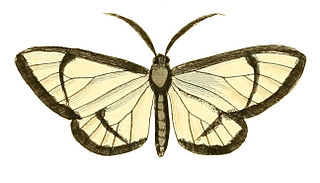
Locha hyalina is a moth species in the family Geometridae from Central and parts of South America. It was described by Dru Drury in 1782, but his name Phalaena diaphana was invalid as pre-occupied.

Lobobunaea phaedusa is a species of very large moths in the family Saturniidae. It is found in much of sub-saharan Africa, where its host plants include African custard-apple, crown-berry, and Aframomum spp.
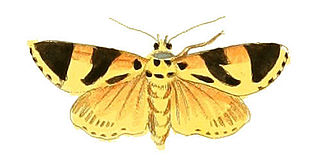
Attatha ino is a species of moth of the family Noctuidae. It was described by Dru Drury in 1782 from "Madras".

Pierella nereis is a butterfly species from the subfamily Satyrinae in the family Nymphalidae. It was first described by Dru Drury in 1782 from Brazil.



















